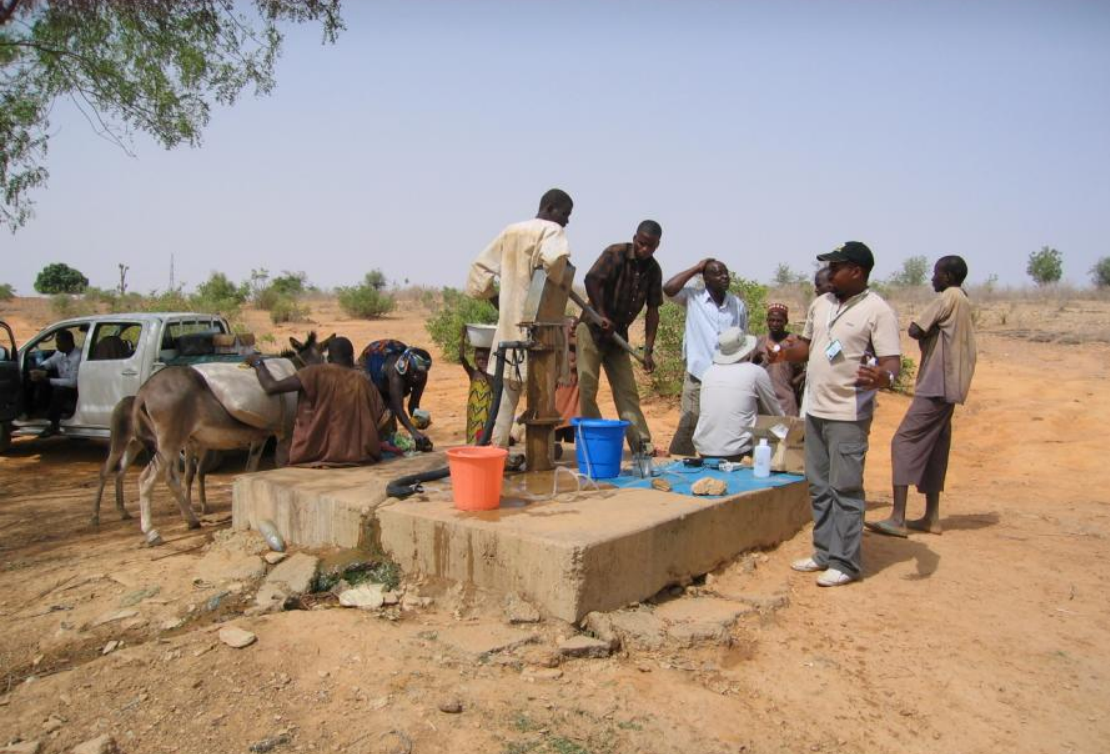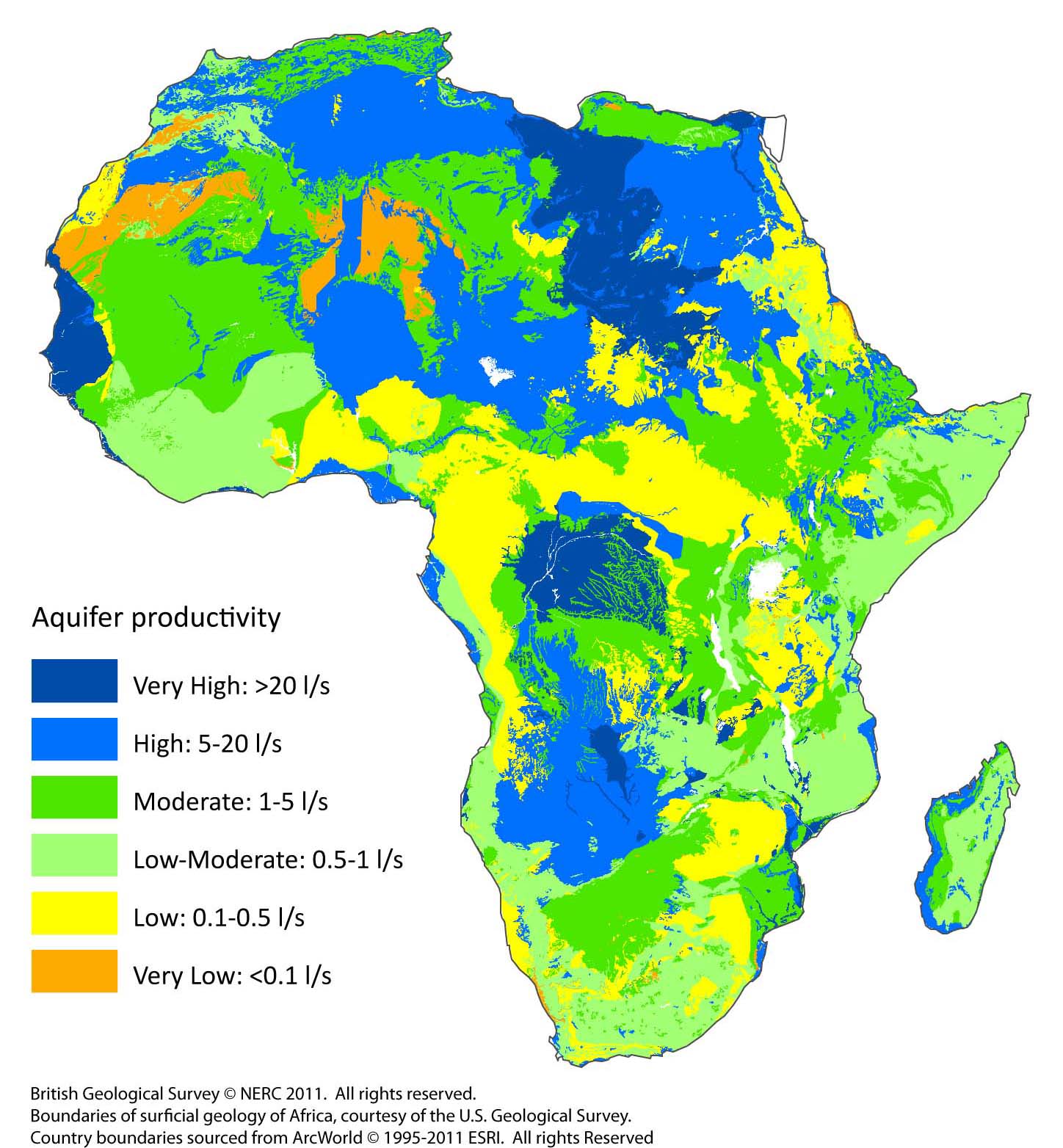Groundwater provides most of the domestic water in rural Africa and supports poverty reduction through irrigation. Reliance on groundwater is likely to increase as rainfall becomes more variable and demand for water becomes greater.
A one-year Department for International Development (now the Foreign, Commonwealth & Development Office)-funded research project aimed to improve the understanding of the resilience of African groundwater to climate change and links to livelihoods.
This is an area of science that has been under-researched, but has much relevance for the formulation of climate adaptation policies.

Pumping drinking water from a shallow groundwater source in Tanzania. BGS © UKRI.
Project details
Groundwater provides most of the domestic water supply in rural Africa and supports poverty reduction through irrigation. Climate change and rapid population growth are likely to impact all water resources, but the response of groundwater will be slower than that of surface water. This could provide a potential buffer to support adaptation strategies.
A key advantage of groundwater is its reliability: aquifer storage ensures that groundwater supplies can be maintained during periods of little or no rainfall and help to even out meteorological variability. As a natural store of water, aquifer storage is many orders of magnitude greater than that which can be achieved through constructing surface water reservoirs.
The IPCC Fourth Assessment report review of climate model projections shows a consistent pattern of progressive warming of the climate in all regions of Africa, but a much less consistent pattern for rainfall (Solomon et al., 2007). The increased temperature will lead to higher rates of evapo-transpiration and will likely increase the intensity and variability of rainfall (Conway, 2011).
Although the exact effects on run-off and groundwater recharge are unclear, most scientists agree that both will become less reliable. Making more use of groundwater will therefore be critical in helping communities and countries adapt and build resilience to changes in climate. This is likely to include the increasing use of groundwater for both small-scale household or village irrigation and larger-scale commercial irrigation alongside increased use of motorised borehole pumps for reliable urban water supply in small towns to larger conurbations.
 Shallow groundwater supply in rural Africa.
Shallow groundwater supply in rural Africa.
The benefits of groundwater are well recognised (MacDonald et al., 2005), but there is limited knowledge of African groundwater resources and how they might respond to changes in climate. There has been little systematic assessment of groundwater storage and availability, which was reflected in the paucity of information on groundwater presented in the IPCC 4th Assessment Report and Technical Paper on Water, where there was major uncertainty as to how changes in climate may affect groundwater (Solomon et al., 2007; Bates et al., 2008).
The aim of the project was to improve understanding of the effects of climate change on groundwater resources and local demand. There were three key objectives:
- strengthen the evidence base linking climate change, climate variability, aquifer resilience and livelihood vulnerability
- support local and international research agendas and programmes, including the ability to collect and interpret data, and transform data into policy-relevant information and knowledge
- develop evidence-based guidance on assessing how groundwater can support adaptation and build resilience to climate change
The BGS-led project team brought together UK researchers from BGS, ODI Global and University College London with research institutions in Nigeria, Tanzania and Ethiopia. This interdisciplinary project team encompassed skills in international water resources, water supply, and water policy and governance.
A steering group comprising senior academics, representatives from the donor community and users, provided guidance to the project team to ensure appropriate and high-quality outputs were provided to the policy community.
The first of their kind, the quantitative groundwater maps of Africa indicate the wide variation in groundwater resources across the continent.
For much of Africa, carefully sited and constructed boreholes will be able to sustain rural handpumps. The potential for shallow boreholes yielding greater than 5 l/s is not widespread, although smaller yields of 0.5 to 5 l/s will be easier to find. Large groundwater stores in the major sedimentary basins, which can accommodate high-yielding boreholes, are often far from population centres and associated with deep water levels.

Aquifer productivity map of Africa. BGS © UKRI.
References
Bates, B, Kundzewicz, Z, Wu, S, and Palutikof, J (editors). 2008. IPCC: Climate change and water, IPCC Working Group II. Intergovernmental Panel on Climate Change Technical Paper VI. (Geneva, Switzerland: IPCC Secretariat.) ISBN: 978-92-9169-123-4
Conway, D. 2011. Adapting climate research for development in Africa. WIREs Climate Change, Vol. 2, 428–450. DOI: https://doi.org/10.1002/wcc.115
MacDonald, A M, Davies, J, Calow, R C, and Chilton, P J. 2005. Developing groundwater: a guide to rural water supply. (Rugby, UK: Practical Action Publishing.)
Solomon, S, Qin, D, Manning, M, Chen, Z, Marquis, M, Averyt, K B, Tignor, M, and Miller, H L (editors). 2007. Climate change 2007: the physical science basis. Contribution of Working Group I to the Fourth Assessment Report of the Intergovernmental Panel on Climate Change. (Cambridge, UK: Cambridge University Press.) ISBN: ISBN 978-0-521-70596-7
New data from focused groundwater case studies
We undertook three case studies to gather new data on groundwater and climate change in Africa.
- Rural water supplies, West Africa
- High-yielding groundwater supplies, Uganda and Tanzania
- Access to improved water supplies and wealth, Ethiopia
Why is this research important?
The research shows that groundwater possesses a high resilience to climate change in Africa and should be central to adaptation strategies: increasing access to improved groundwater sources based on handpumps is likely to be highly successful. However, building strategies that depend on the availability of widespread, higher-reliability yields from groundwater are likely to be problematic.
Contact
Please contact Alan MacDonald for more information.

